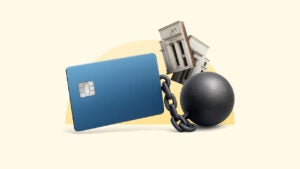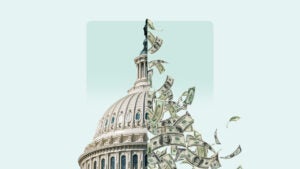How changes in interest rate affect debt

Key takeaways
- Interest rate changes have an immediate effect on revolving or variable-rate debts like credit cards.
- Secured loan interest rates don’t rise or fall as much as unsecured loan rates.
- The overall economic outlook influences how much lenders charge for you to borrow — whether you opt for secured or unsecured financing.
Interest rate changes have an impact on every dollar you borrow. They can make or break the affordability of the car you drive, the house you live in or the college you attend. Over 70 percent of U.S. adults carry some form of debt ranging from credit cards, mortgages and auto loans to student loans and personal loans.
If you currently have or plan to take out any form of debt, understanding how interest rates impact the cost of borrowing is crucial to making informed financial decisions. Knowing how interest rate changes affect debt can help you make better decisions about credit and get you on firm financial footing.Not knowing can lead to unpleasant surprises when you get your monthly bills and wonder why your minimum monthly payments keep increasing.
How interest rates affect your debt
There are two primary ways that interest rates affect your debt. The most noticeable effect is on your monthly payments. When rates rise, it’s more expensive to borrow, and that expense shows up as a higher monthly payment. When they fall, it’s cheaper to borrow, and you owe less monthly.
The second effect is not as easy to see unless you calculate how much interest you’ll pay over the life of your loan. When rates rise, the total amount of debt you pay on any new debt increases. When interest rates fall, you pay less.
Short-term vs. long-term debt
A lower interest rate may only save you a few hundred extra dollars over the life of a loan with a short term, like a personal or auto loan. However, you could end up paying or saving tens or even hundreds of thousands more in interest charges over the term of a 30-year fixed-rate mortgage.
Personal loan
| Loan amount | Term | Interest rate (fixed) | Monthly payment | Total interest paid |
|---|---|---|---|---|
| $11,700 | 3 years | 10% | $377.53 | $1,890.94 |
| $11,700 | 3 years | 12% | $388.61 | $2,289.87 |
Difference in interest paid: $398.93
Mortgage
| Loan amount | Term | Interest rate (fixed) | Monthly payment | Total interest paid |
|---|---|---|---|---|
| $420,000 | 30 years | 7% | $2,794.27 | $585,973.00 |
| $420,000 | 30 years | 12% | $4,320.17 | $1,135,262.00 |
Difference in interest paid: $549,352.00
Fixed vs. variable-rate debt
Most consumers have a credit mix of fixed-rate and variable-rate debt. When your rate is fixed, it stays the same, and you pay the same monthly amount. Variable-rate debts come with possible payment changes, making it harder to predict how much you’ll owe each month. This can be a good or bad thing, depending on how interest rates fluctuate with the market.
Examples of common fixed-rate debt include auto loans, fixed-rate mortgages and personal loans, as well as federal and most private student loans. If you already have a fixed-rate loan, you don’t have to worry about your rate heading higher. If rates drop, you can replace your high fixed-rate loans with new lower interest debt through a process called refinancing.
A variable rate is usually tied to debt like credit cards and home equity lines of credit (HELOCs). The interest rate on these types of loans typically increases or decreases in line with changes to the Fed funds rate. Your credit card or HELOC payment can also change as the Fed funds rate moves.
Secured vs. unsecured debt
If you’ve applied for a credit card and a car loan in the past year, you probably noticed that auto loan interest rates are much lower than credit card interest rates. One simple explanation for the difference is that auto loans are secured and credit cards are unsecured.
A lender can cover financial losses by repossessing your car if you can’t repay an auto loan. A credit card lender can ding your credit score and send the account to collections, but there’s no asset it can to cover an unpaid balance.
When the Fed hikes rates, an unsecured loan interest rate spikes higher than secured loan interest rates. You’ll see secured interest rates drop to much lower levels when the Fed cuts rates, especially with a valuable asset like a home.
How unsecured loan interest rates affect debt
Rate changes are the fastest to show on your credit card bill and in the rates quoted on unsecured personal loans. Understanding the impact can help you decide if it’s time to refinance or pay off your unsecured debt — and if you’d be better off avoiding this type of debt altogether.
Credit card debt
Credit card lenders usually set interest rates based on the prime rate, which is higher than the Fed funds rate. When the prime rate goes up, so does your credit card interest rate. Your minimum monthly payment increases, and you pay more interest on any balance you carry.
If you’re making extra payments, you may need to increase the amount paid to account for increased interest charges. Otherwise, your balance won’t drop as much as you want.
Personal loan debt
Like credit cards, personal loan rates are also pegged to short-term rates like the prime rate. However, personal loans are tied to the economy. For example, if unemployment rises or wages drop and people have less income, personal loan rates may actually increase, even if the overall forecast is for lower rates.
You’ll end up with a larger monthly payment when rates increase. A higher payment could mean a lower approved amount since lenders qualify you based on how much total debt you have compared to your income, or your debt-to-income ratio.
If rates are too high, you won’t be able to borrow as much. Or you may have to choose a longer term — like seven years instead of five years — to qualify, which costs you more in total interest over the long haul.
That said, personal loan rates tend to be much lower than credit card rates. Even if overall rates are marching upward, it may be worth considering a personal loan for debt consolidation to clear expensive credit card debt. An added bonus, your credit utilization ratio may drop, which is a major factor in how high or low your credit score is.
How secured loan interest rates affect debt
Lenders offer lower interest rates on secured loans because you give them the right to seize an asset like your car or home if you don’t meet the repayment schedule set by your loan contract. You’ll see the change reflected in auto and boat loan rates when rates change.
However, mortgage rates and other longer term loans don’t move automatically with Fed fund rate changes. They may go up or down months ahead of an expected cut to the Federal funds rate or immediately after bad economic news like higher unemployment.
Secured loans require collateral, most commonly your shelter, transportation or another high-value asset. Knowing how interest affects secured debt can help you protect those assets by knowing what to do when rates change.
What happens to debt when interest rates fall?
Any time interest rates fall, it’s time to examine opportunities to replace your current credit card or personal loan balances with lower-rate alternatives. Refinancing your existing debt could both lower your interest rate and potentially your monthly payment, even if the loan term is extended.
Lower interest rate credit card strategies
When interest rates start to drop, you’ll probably get many offers for lower interest rate balance transfer cards. Before you apply for any, make sure you look at all of the fees involved in moving your current credit card balances.
It’s common for there to be a fee of up to 5 percent to move the money to the new card. However, you should weigh this fee against any promotional interest rate you receive. The money you save by paying less interest over a 12 to 18 month could offset the balance transfer fee, and there are quite a few 0 percent APR cards out there to consider.
Lower interest rate personal loan strategies
If you have existing personal loan balances at very high rates, you may want to replace them with a new lower rate personal loan. If the payment is affordable, try not to extend the current loan term beyond how many years you have left to save money on interest.
Lower rate secured loan strategies
Lower rates allow you to buy a more expensive car or boat at a lower payment. That minivan or SUV may be more affordable when rates drop, or you may be able to refinance your current vehicle to save money.
Mortgage refinancing becomes much more attractive, especially if 30-year mortgage rates drop below your current pay rate. Cash-out refinances are worth a look when rates drop because they allow homeowners to consolidate high-interest rate debts with one low mortgage rate and payments spread out for up to 30 years.
The drawback is if you default, you could lose your home. Even if you can afford it, you’ll net less profit when you sell the home. Avoid refinancing for a longer term than you have left. You’ll pay much more interest over the life of a new 30-year loan if you only have 20 or so left.
What happens to debt when interest rates rise?
When the Fed hikes rates, you’ll see an immediate increase in auto and boat loan rates. Like credit cards and personal loans, lenders set the rates for shorter term secured loans — with terms of no more than seven years — based on movements in the Fed funds rate. Higher rates mean higher car payments or bigger boat loan payments.
Even though mortgages are secured loans against your home, they don’t automatically change with Fed rate cuts or hikes. Mortgage rates follow benchmarks such as the 10-year Treasury yield, which looks at the longer term health of the economy.
Higher secured loan interest rate strategies
Regarding auto or boat loans, higher rates mean higher monthly payments. You may want to choose a longer term so you don’t strain your budget, or make a down payment and borrow less to lower your payment. Alternatively, you may need to choose a less expensive car or find an older, higher-mileage used one.
Higher rates make it harder to qualify for a home mortgage. You can make a bigger down payment to reduce the amount you borrow to lower your payment. Some consumers take out adjustable-rate mortgages when fixed rates are high. You can choose a lower introductory rate for three, five or seven years and refinance when fixed rates drop. The danger is that if the Fed doesn’t cut rates, your mortgage rate could spike after the initial low-rate period ends, leaving you with a payment you can’t afford.
With recent home equity loan rates rising to over 8 percent, you may want to consider an unsecured personal loan instead. You could get the money you need at a comparable rate without borrowing against your home’s equity.
How interest rates affect your ability to borrow
You may hear the term “credit availability” when interest rates change in the lending world. Generally, it’s harder to borrow when rates are higher and easier when rates are lower. However, the effects of rate changes differ depending on the loan type you’re taking out.
Getting credit when rates are higher
It can be frustrating to borrow money when rates rise. Lenders may not want to lend as much, or they may focus on borrowers with higher credit scores and avoid bad credit lending. Some characteristics of qualifying for a loan when rates are higher include:
- Reduced loan amounts. Higher rates lead to higher payments and DTI ratios. Lenders may want to reduce the amount they’re willing to lend to any individual. This spreads the risk out among several smaller loans to multiple borrowers versus one large loan to one person.
- Less borrowing power. You may need to scale back your house hunt, shop for an older used car or wait on financial goals that require debt.
Getting credit when rates are lower
- Qualifying becomes easier. A lower payment makes it easier for you to qualify for any type of debt. You can put yourself into a better financial position by looking at refinancing all types of debt, including auto loans, credit cards and mortgages.
- Lenders will compete for your business. You have more leverage when choosing a lender and can haggle to get the best rates when rates drop. Your local bank, credit unions, online lenders and even your current lenders may be willing to waive fees, offer interest rate or closing cost discounts or offer no-cost refinancing options.
Where are interest rates headed?
In September 2025, the Federal Reserve lowered the target federal funds rate to 4-4.25 percent, the first move of 2025. “Looking ahead, two additional rate cuts are expected in 2025, for a total of three including the September cut,” says Stephen Kates, CFP, financial analyst for Bankrate. “Only one more is projected for 2026, though the timing remains uncertain.”
Even with uncertain timing, there is a chance that the target rate could fall almost a whole percentage point from where it was set at the September meeting — should projections hold.
Most interest rates will generally follow the Federal Reserve’s lead into lower territory, but they’ll move at their own pace. Variable and revolving credit products like credit cards and home equity lines of credit are typically the first to adjust, while fixed rates on auto and personal loans tend to respond more slowly.— Stephen Kates, CFP, financial analyst for Bankrate
How to get the best interest rates
Shopping around for rates is still one of the best ways to ensure you get the most favorable offer, but a solid credit score will go a long way this year. Excellent credit borrowers are more likely to see benefits of a gradually decreasing rate environment sooner than those in other credit bands.
Make sure to check your credit reports at least 30 days prior to applying for a loan. Doing so will allow the max amount of time lenders have to respond to a dispute.
When comparing options, don’t just look at the interest rates. Consider origination fees, prepayment penalties and any other fees assessed by the lender. This will help you keep borrowing costs low.
Why we ask for feedback Your feedback helps us improve our content and services. It takes less than a minute to complete.
Your responses are anonymous and will only be used for improving our website.









